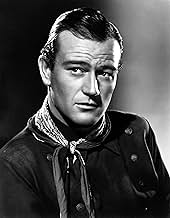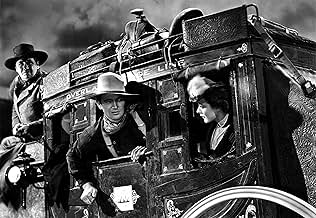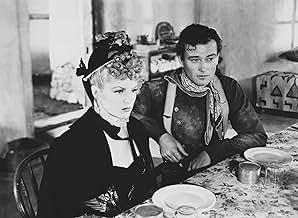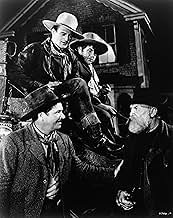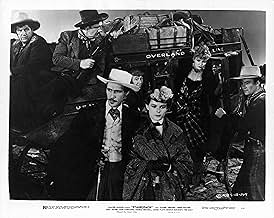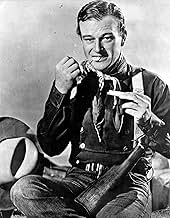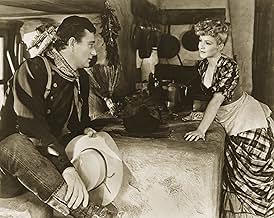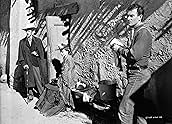Un grupo de personas que viajan en una diligencia ven complicado su viaje por la amenaza de Gerónimo y aprenden algo sobre los demás en el proceso.Un grupo de personas que viajan en una diligencia ven complicado su viaje por la amenaza de Gerónimo y aprenden algo sobre los demás en el proceso.Un grupo de personas que viajan en una diligencia ven complicado su viaje por la amenaza de Gerónimo y aprenden algo sobre los demás en el proceso.
- Dirección
- Guión
- Reparto principal
- Ganó 2 premios Óscar
- 10 premios y 5 nominaciones en total
- Girl in Saloon
- (sin acreditar)
- Indian Scout
- (sin acreditar)
- Bit Part
- (sin acreditar)
- Bit Part
- (sin acreditar)
- Lordsburg Saloon Owner
- (sin acreditar)
Reseñas destacadas
But the real star of the show is John Ford, the director. To introduce and define nine characters in the context of a fast-paced western is no easy task, and he accomplishes it in masterly fashion. Much of the action takes place in the limited confines of a stagecoach, but Ford takes advantage of the limits by staging brilliant and subtle bits between characters; John Wayne casts sultry glances at Clare Trevor, who blossoms under his glance, the young calvary wife's eyes glaze over as the banker pontificates, and Doc sneaks sips of whiskey from the samples case while he solicitously keeps the wind from chilling the whiskey salesman. When the action moves outside, he films the action in dynamic angles and stunts that were the most daring of its time.
If you enjoy westerns and haven't seen this, you have a great night of film-watching ahead of you. And if the last time you saw Stagecoach was some midnight years ago when you wandered home for a bit of the late show before bedtime, watch it again and rediscover what a great western it is
Hokey? Not really -- the story's quite good, and for the most part, the acting's wonderful. John Wayne's great as the Ringo Kid -- this actually may be one of his best Western roles. The Ringo Kid is a murderer, looking to avenge his family, but he's also a fairly principled man. The role's a lot deeper and more complex than some of Wayne's later `white hat' heroes who were always perfectly good and flawless. The Ringo Kid wants a normal life, but at the same time knows he'll probably never have one, and John Wayne pulls off this internal conflict flawlessly. Wayne also has great chemistry with the wonderful Claire Trevor, who plays Dallas, the former lady-of-the-evening -- she's also seeking to create a new life, and the uncomfortable, almost shy way she reacts to Wayne's gentle, genuinely polite comments is terrific to watch. Like the Ringo Kid -- indeed, like most of the characters in `Stagecoach' -- Dallas wants to change her life around, but doubts that she can. The other characters in `Stagecoach' are excellent as well, but it's Claire Trevor and John Wayne who really make the film enjoyable. (Side note -- while he's quite good, I was shocked to read that John Mitchell actually won an Oscar for Best Supporting Actor for his portrayal of Dr. Josiah Boone in this film. His character's essentially a cross between W.C. Fields and Yoda, and while I'm not sure who else was in contention for the Best Supporting Actor award with Mr. Mitchell, I find it hard to believe that this was, in fact, the best supporting performance captured on film in the year 1939.)
John Ford's direction is excellent as well. `Stagecoach' is the first film where Mr. Ford used the breathtaking landscapes of Monument Valley, and even in black-and-white, they're still used to vivid effect. His action shots of an Apache attack and war raid are also stunning, even by today's standards. Ford also has great touch with changing moods in `Stagecoach' -- the film moves effortlessly from light comedy to tear-jerking drama, and the changes of mood never seem contrived. `Stagecoach' is clearly one of John Ford's better films.
Does `Stagecoach' have problems? Yes, but most of them are more a by-product of the customs and conventions of filmmaking in the 1930s. For example, the music is often obtrusive, and doesn't always fit with what's actually happening in a given scene. There's also not a lot of time spent exploring the character's backgrounds -- it would've been nice to know lot more about where the characters had come from (particularly Dallas), if only to help understand each character's motivations. Since this can be said about most films made during this era, it' somewhat forgivable. However, one significant flaw of `Stagecoach' itself is the character of Hatfield (John Carradine) -- while Mr. Carradine does a good job with the part, the character constantly contradicts himself. He behaves one way in one scene, then in a completely different manner in the next, and there's never a reason given for this. Add to this that Hatfield adds next to nothing in the film (his only useful purpose, apparently, is to ask Mrs. Platt (Lucy Mallory) `Are you all right?' every thirty seconds), and he becomes totally superfluous. If the part of Hatfield had been excised entirely from the script, "Stagecoach" would have been much better.
`Stagecoach' is not a typical Western (there's a lot more character introspection going on than blazing six-shooters), but it's an extremely entertaining film nonetheless. The memorable interaction between John Wayne and Claire Trevor alone makes it a near-classic. Grade: A-
Although I miss seeing the desert landscape in full yellows and blues, this film is one of my favourite westerns and only suffers a little by being in black & while and not really enjoying the visual sweep that later Ford westerns had. The plot is quite simple on one hand - a group battle Indians on their way to a town while some of the characters confront their own battles. However this succeeds because it is more than just a B-movie shoot'em up, it has characters and sub plot.
The characters may be quite broad and the film may well use them like a disaster movie (set them up just enough to care about and then see who gets knocked down) but it does have touches that improve it. Characters are shunned due to their social status, `good' people are revealed to be not so good as they think themselves while `bad' people reveal themselves to have good hearts and the potential for redemption in their lives. While it isn't earth shattering it is well crafted and well written in the context of the traditional western.
Wayne is good and this film allowed him to step up from B-movie westerns to the type of films that made his career. The rest of the cast are also good in their various roles, while the characters are broad they all play it well, especially Trevor, Devine, Mitchell and Carradine.
Overall this is a solid western that has good action (include a great stunt that was lifted directly into Raiders of the Lost Ark) but also has characters and interactions which make for a polished and enjoyable movie.
The first pairing of Ford and Wayne changed the course of the modern Western turning into adult Western , portraying in depth characters and brooding events with allegorical issues running beneath surface script . But the movie's little budget looked cash well spent when this classic picture earned more than two million dollars on first exhibitions . Based on the story 'Stage to Lordsburg' by Ernest Haycox and this one based on Guy de Mauspassant's novel . Outstanding cinematography capturing the nebulous skies by Bert Glennon and Ray Binger . Thrilling as well as sensitive soundtrack by Richard Hageman based on traditional music . Slick edition by Dorothy Spencer , a woman with a long career during fifty years . Stunning shooting by John Ford in the mythical Monumental Valley , a place that Ford was often to revisit and he befriended Indians tribes . The film won Academy Award for secondary actor , Thomas Mitchell , original musical score and was nominated to best movie for Walter Wanger and major studio , United Artists ; furthermore, for edition and Production Design . Very inferior remake in 1966 by Gordon Douglas with Alex Cord , Anne Margret , Red Buttons , Van Johnson , Mike Connors ; and a forgettable adaptation for TV in 1986 by Ted Post with Willie Nelson , Johnny Cash , Elizabeth Ashley , Mary Crosby , Tony Franciosa , John Schneider and Kris Kristopherson.
¿Sabías que...?
- CuriosidadesYakima Canutt explained how the stunt was accomplished where, as an Apache warrior attacking the stagecoach, he is "shot", falls off his horse, and then gets dragged underneath the stagecoach: "You have to run the horses fast, so they'll run straight. If they run slow, they move around a lot. When you turn loose to go under the coach, you've got to bring your arms over your chest and stomach. You've got to hold your elbows close to your body, or that front axle will knock them off." After the stunt was completed, Canutt ran to director John Ford to make sure they got the stunt on film. Ford replied that even if they hadn't, "I'll never shoot that again."
- PifiasBefore Ringo hands his Winchester rifle to Curley after finding him stranded outdoors on the stagecoach trail, he ejects a chambered round, which after flying behind his head, can be heard as a knock as if hitting the soundstage floor. Also, it would have been unrealistic to waste a live round of ammunition with hostile Indians in the area, especially after telling Curley that he (Curley) may need his Winchester.
- Citas
Marshal Curly Wilcox: Come busting in here - you'd think we were being attacked! You can find another wife.
Chris: Sure I can find another wife. But she take my rifle and my horse. Oh, I'll never sell her. I love her so much. I beat her with a whip and she never get tired.
Dr. Josiah Boone: Your wife?
Chris: No, my horse. I can find another wife easy, yes, but not a horse like that!
- Versiones alternativasAlso available in a computer-colorized version.
- ConexionesEdited into Laramie (1949)
- Banda sonoraTrail to Mexico (Bury Me Not on the Lone Prairie)
(uncredited)
Traditional ballad
Variations played throughout as part of the score
Selecciones populares
- How long is Stagecoach?Con tecnología de Alexa
Detalles
- Fecha de lanzamiento
- País de origen
- Idiomas
- Títulos en diferentes países
- La diligència
- Localizaciones del rodaje
- Agathla Peak, Arizona, Estados Unidos(Peak in background at start of stagecoach trip)
- Empresa productora
- Ver más compañías en los créditos en IMDbPro
Taquilla
- Presupuesto
- 392.000 US$ (estimación)
- Duración1 hora 36 minutos
- Color
- Relación de aspecto
- 1.37 : 1
Contribuir a esta página




